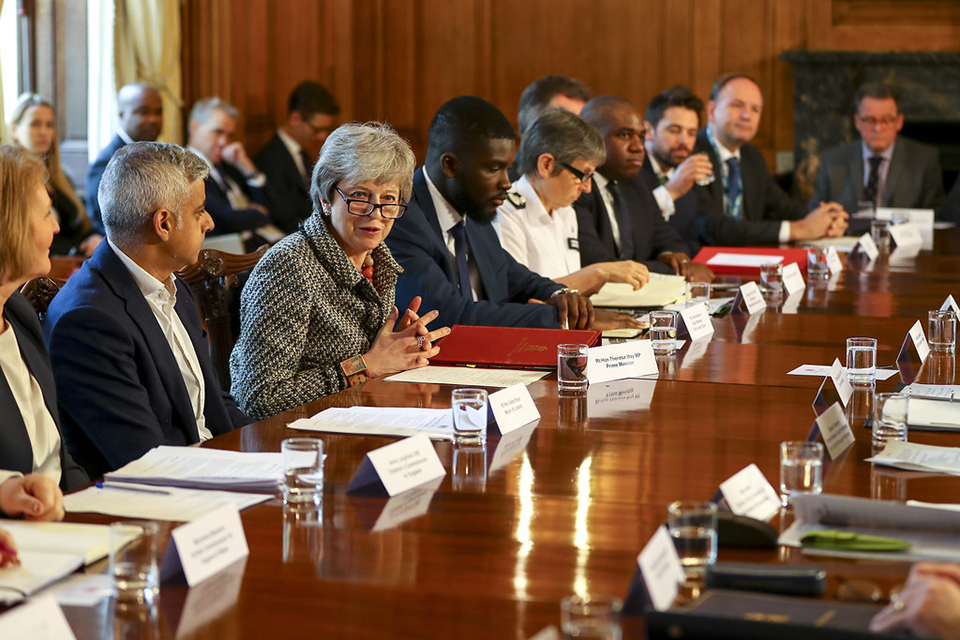PM opening statement at Serious Violence Summit: 1 April 2019
Prime Minister Theresa May spoke at the Serious Violence Summit in Downing Street.

Good morning everyone.
Thank you very much for coming here to Number 10 today to discuss tackling the issue that is a top priority for government and for the organisations who are represented here around this table. But perhaps more important, it’s an issue that families, and young people and communities across the country, are concerned about and want to see us tackling.
And in the recent months we’ve seen an appalling number of young lives that have been cut short or devastated by serious violent crime, including a number of horrifying incidents which took place just over this weekend. And as we look at what’s happened of course what we also see is that in many cases the perpetrators of these crimes are as young as our victims. And this is something that has to be of deep concern to us all.
It is a challenge that collectively affects us as a society, and it is a challenge that as a society we need to rise up to and to act to deal with.
And not deal with as individuals in isolation - as single organisations or single politicians or individuals in the community - but actually dealing with it in a great, co-ordinated, wide-reaching and long-term effort. With all of us coming together to address this issue.
Of course we would always make sure that the resources and tools are there to be able to apprehend and deal with those who are carrying and using knives, and the police have what they need to do – but we cannot simply arrest ourselves out of this problem.
This is a wider problem. It’s more deep seated and we need to have a more coordinated effort in response to it.
If you think about it, if it was a devastating disease that was affecting young people yes, we would be treating the symptoms but we would also be asking ourselves the question of what is the underlying cause.
And that is that in relation to this issue we need to take the same approach to the cancer of serious youth violence.
It is more than just law enforcement.
And that is what this week’s summit is about. It’s about bringing together people from different aspects of society, with different responsibilities ,with different experience to ensure that we can build on the work that’s being done as in the Serious Violence Summit, and the Youth Endowment Fund, but also to make sure we come together in this multiagency, whole-community approach to serious youth violence.
And that’s where of course this approach, often referred to as the “public health approach”, is one of the things we want to be discussing this week.
That’s where everybody is working together across the system in multiple agencies - sharing information - but crucially making sure that every contact counts.
And to help make that happen, today we’ve launched a consultation on a public duty that would underpin such an approach.
I can also announce that we are setting up a new Ministerial Taskforce that will co-ordinate the government’s role and make sure all departments are playing their part. It needs, again, to be a collective approach across government as it is between government and other organisations.
And there will be a new Serious Violence Team which will be set up in the Cabinet Office as well which will have representatives from across government to ensure join-up, and will also be well-placed to assist local areas as they build operational equivalents in their own Violence Reduction Units.
In a moment I’ll ask the Home Secretary to talk a little more about the size and scope of the challenge we face and the work we have already undertaken to tackle it.
But first we will hear from some of the experts who have joined us today.
I’m grateful to everybody around the table because everybody has come with expertise and understanding and experience of this issue. We have sitting around the table people who have delivered transformational change and real reductions in violence across the UK and the US.
So let me introduce Professor Mark Bellis, from Public Health Wales, and Dr Jens Ludwig, from the Chicago and New York Data Labs. I know you’ve travelled to be here today so thank you – particularly to Dr Ludwig for travelling as far as you have to be with us here today. We want to be able to learn from you and I know that in the chat that I’ve had with Mark in the past about the different roles and the importance of the work that you’ve done, and we very much look forward to learning from both of you.
Nothing that is said today of course will bring back the young people whose lives have been so cruelly taken by serious violence.
But what we can do today is to send a very clear message that “this must stop” and a very clear message that collectively we will do everything we can to make sure that it stops.
And we can begin to shape this new approach that will meet the scourge of youth violence head on, so that more families are spared the unimaginable suffering that sadly too many families have endured in recent months.
So with that I’ll pass over to Jens.